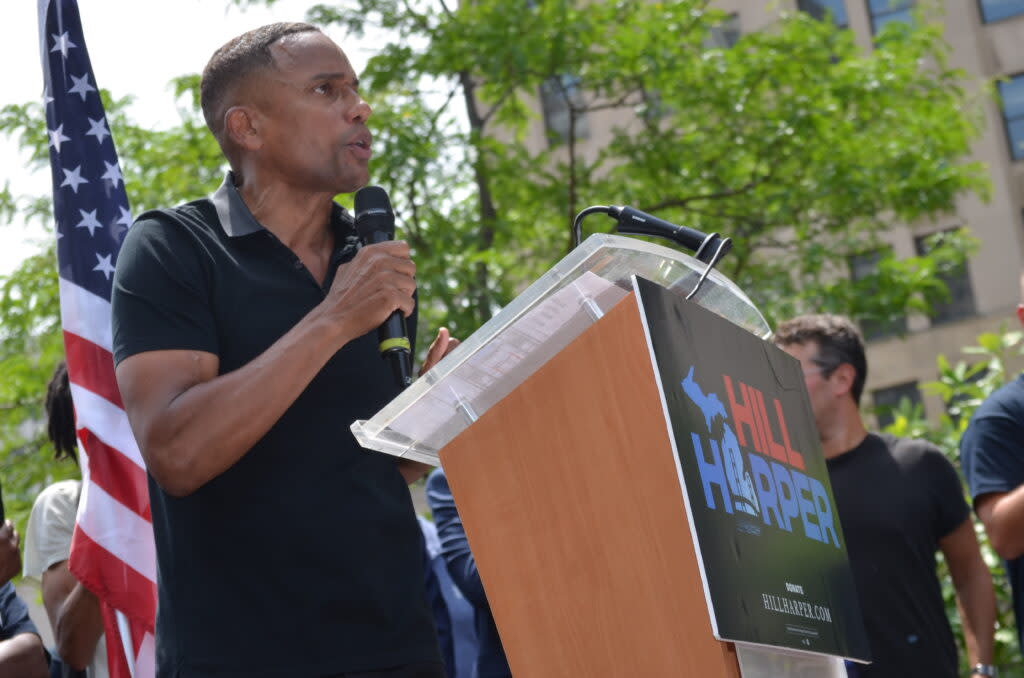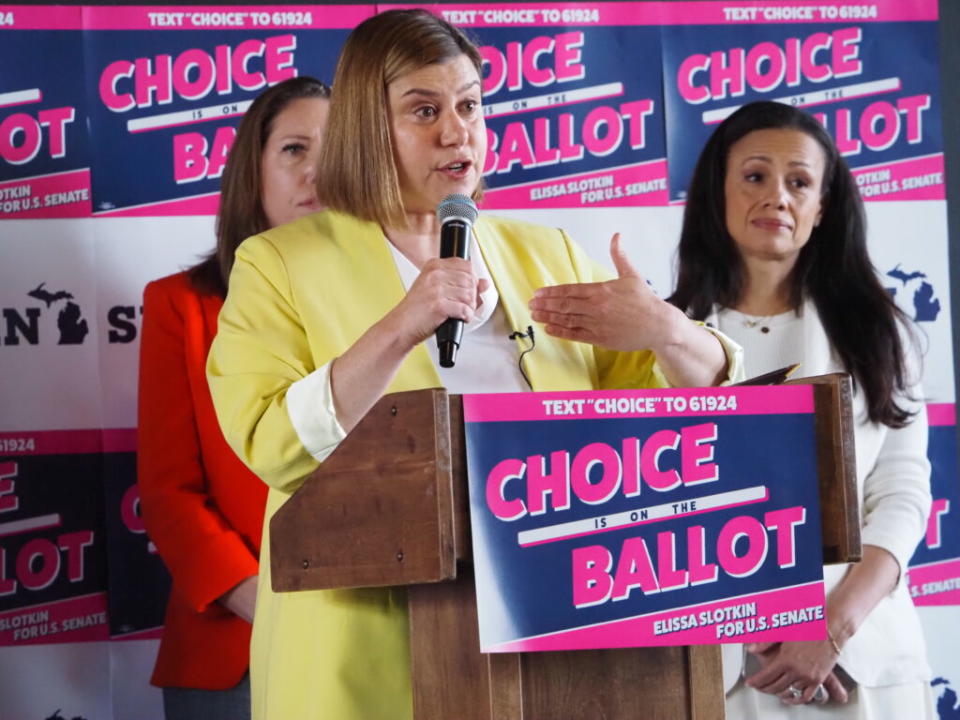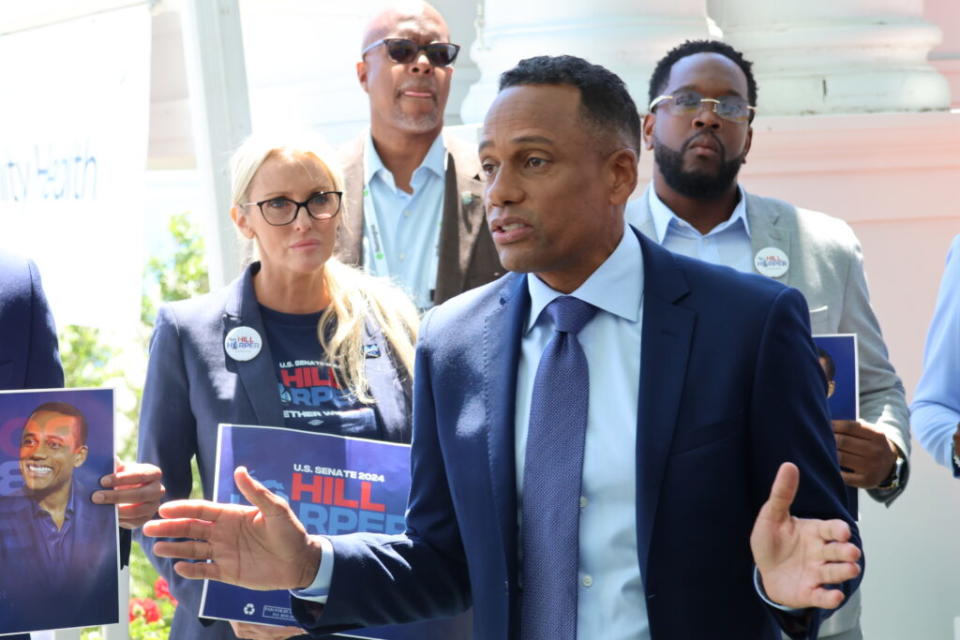Harper says canceled US Senate debate was ‘sham,’ slams Slotkin for avoiding him before primary

Hill Harper in Detroit | Ken Coleman
Calling it a “sham,” Detroit Democrat Hill Harper has pushed back against assertions that a previously planned debate with U.S. Rep. Elissa Slotkin (D-Holly) was canceled because of demands he made.
Harper and Slotkin are vying for the Democratic nomination for the open U.S. Senate seat in the Aug. 6 primary. They had been set to appear Friday morning on WHPR, a small Black-owned radio and television station in Highland Park which had planned to host the event. But the station’s owner, R.J. Watkins, abruptly canceled the debate on Wednesday citing last-minute demands from Harper’s campaign.
In a Zoom call with reporters Thursday, Harper sharply denied that, saying he had merely supported a letter sent to the station by “really accomplished incredible Black women” including former U.S. Rep. Brenda Lawrence (D-Southfield), Wayne County Commission Chair Alisha Bell and Lathrup Village Mayor Kelly Garrett, among others.
“That letter did not come out of my campaign,” said Harper. “And it was signed by Brenda Lawrence, who served two terms with Rep. Slotkin and decided to endorse me. That was one of the biggest, I think, messages sent that said, ‘Hey, I worked alongside this person for two terms, but I’m actually siding and supporting somebody else.’ If that doesn’t send a message, I don’t know what does.”
The letter to the station said the group would urge Harper not to participate in the debate if an “African American woman journalist” was not added as a moderator, that the debate be broadcast live with video, a studio audience be included to ask questions along with allowing news reporters and cameras in the studio. Otherwise, the letter said the event would be one that “excludes Black women from having a seat at the table, limits voter access and denies the press an opportunity to cover a public debate on issues important to our community.”
The debate moderators were scheduled to be Bishop Edgar L. Vann II, the senior pastor of Second Ebenezer Church, and Darwin Griffin, who hosts WHPR’s “Truth to Power” show. And while the station broadcasts a television signal, the debate was agreed to as “audio only” through a live broadcast on 88.1 FM while also being streamed on WHPR-TV, on Roku as well as the station’s social media platforms.
“What kind of TV station hosts a television program of this importance but doesn’t record and broadcast it live on TV?” the letter said.
Watkins told The Detroit News that the terms of the debate had been agreed to more than a month ago by both campaigns and the station could not accommodate a live audience on such short notice. He also indicated that the event was never closed to outside media.
Regardless. Harper said his decision to stand with the signers of the letter was not a tough one for him.
“My mother is an 86-year-old Black woman who lives right here with me in Detroit. And if Black women come to me and Black women raise an issue where they’re totally correct on the issue, I’m going to stand with Black women. I mean, it’s unequivocal,” he said.
In response to the cancelation, Slotkin’s campaign spokesman Antoine Givens released a general statement to media outlets.
“We’re grateful to WHPR for their work to set up this debate,” he said. “Elissa agreed to it over a month ago, and was prepping in earnest. She will instead continue to directly engage voters in Detroit and across the state.”
Bell said she signed the letter to bring the issue of representation to light, especially in a primary campaign seeking the votes of Black women.
“To have the Slotkin campaign not come out and say, ‘You’re right, we should have a Black woman.’ They’ve been radio silent through this whole process, and I think we know why. I mean, of course, they would rather not debate Hill because they know how that’ll probably go for them. So I think they were fine with how it turned out,” said Bell.
Harper brought up the issue of representation for Black voters during the Mackinac Policy Conference in May after a scheduled Senate debate featuring both Democrats and Republicans was canceled when both Slotkin and former U.S. Rep. Mike Rogers (R-White Lake) backed out. Rogers is facing former U.S. Rep. Justin Amash (I-Cascade Twp.) and Niles physician Dr. Sherry O’Donnell in the GOP primary.
“There’s so many people out here across Michigan — I’ve been to all 83 counties —folks that don’t feel represented by their federal delegation,” Harper said during the May 30 press conference. “The fact that Elissa Slotkin pulled out of this debate is yet another example of the lack of representation that folks feel.”
Slotkin also declined an invitation to appear on WDIV’s Flashpoint with Harper, who ended up going on solo earlier this month.
Harper said that after the canceled debate at the Mackinac conference, he requested four debates with Slotkin and the one on WHPR was all that her campaign would agree to. With absentee ballots already being turned in, he said they asked the station to move up the date, but they declined.
“It’s a television station, so the assumption was it was going to be televised, but then we realized it was audio only,” said Harper. “And then we said, ‘OK, well, we’re going to stream it.’ And then there was pushback on this idea of streaming. Then it was like, was there going to be an audience and journalists available to write the stories about the debate? No journalists. In fact, are there going to be journalists as moderators? No journalist is even a moderator. And so I think it’s clear to everybody it’s a sham debate.”
Harper was adamant that he had nothing to do with the debate being canceled.
“At no time did I say I was pulling out of the debate. At no time did I say I’m not debating, at no time did I say that. That debate was canceled, and then it made it seem through their press release that it was my fault it was canceled, which couldn’t be further from the truth,” he said.
Garrett told reporters on the call that the issues that were raised in the letter were issues that must be responded to.
“Once again as Black women, we were ignored instead of them trying to resolve the issue by having a Black journalist, a Black woman, a female journalist there, having maybe a couple of Black women in the audience. Instead of trying to resolve it, you canceled it, which to me said you don’t need any Black women to be involved in any of these campaigns. But yet and still, it’s always our demographics that you run to when one wants to make sure or try to make sure that their campaign will win,” she said.


